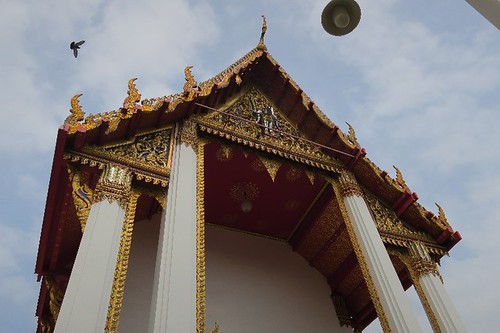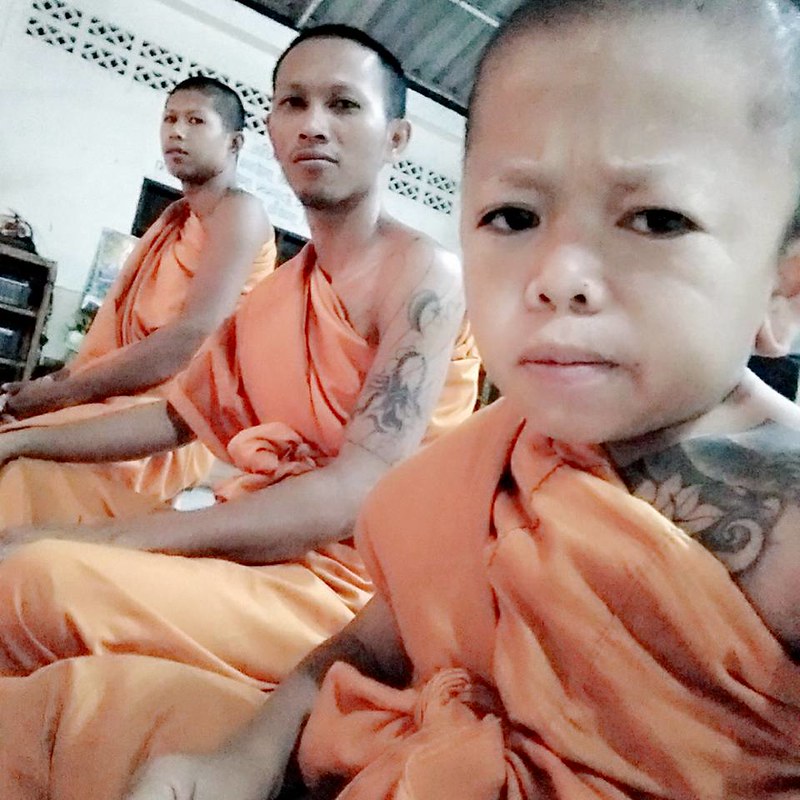The recent disrobing of Venerable Sermsak Thammasaro or “Monk Ti” for his dwarfism has spurred discussion about Thai Buddhism and discrimination. According to liberal Buddhist monk Venerable Phramaha Paiwan Warawunno, Monk Ti was disrobed because ordination of the disabled is against the Buddhist Vinaya. According to well-known religious scholar Surapot Thaweesak, Thai Buddhism tends to rule in favour of the clergy, and under the power of the Sangha Supreme Council (SSC), does not allow other parties to pass judgement on cases or issues that crop up.

Ever since the Buddha’s lifetime, the qualifications of those eligible for ordination and tonsure to be novice monks have been regulated in the 227 articles of monastic discipline of the Vinaya Sangha (Patimokkha), which include characteristics that render one unsuitable for the monkhood. Characteristics such as hearing disabilities, shortness, having been flogged or whipped, etc., were considered as qualities that hinder one from studying and ordaining to be a monk. However, in the present day, the social context and conditions have changed. Unlike in ancient times, there are spaces in society for LGBT and disabled people. Therefore, it is curious whether the literal interpretation of Thai Buddhism is concurrent with changing societal norms.
During the past week, social media was abuzz with the news of how an abbot in Chanthaburi Province suddenly disrobed Monk Ti Maisungnoen or Venerable Sermsak Thammasaro (read more here) on the grounds that Ti’s status as a monk breached monastic law because he was disabled with dwarfism, and therefore was a burden on the other monks. Monk Ti is 99 cm tall and weighs 15 kilograms.
Monk Ti’s case ignited discussions on social media on the suitability of his disrobing. Many expressed sympathy for Monk Ti and his apparent devotion and how he was able to carry out his monastic duties appropriately, just like the other monks.
Liberal Buddhist monk Venerable Phramaha Paiwan Warawunno, who is known for his criticisms of the Sangha, spoke to Prachatai on Monk Ti’s case. He pointed out that according to the Vinaya, monks cannot be forced to disrobe even if they are short, which is one of the 32 conditions against ordination as novice monks and monks. In fact, punishment must be dealt to the person who ordained that monk, and even that punishment should be for a misdemeanour against the rules, which is the lightest punishment. An order to disrobe, therefore, is outside of the jurisdiction of the Vinaya.
“The prohibition on disabled people being ordained has existed since the start of the propagation of Buddhism. The issue was one of caution. For example there was the fear that if many disabled people were ordained into the religion, then Buddhism would be like the home of these people, who would not make a living. There was concern that this would create a burden for others, especially if they could not carry out religious duties or practice the dharma. Therefore, Lord Buddha said that the disabled ‘should’ not be ordained, but did not forbid it outright.”
“However, if [the disabled person] is already ordained, then the punishment should be redirected to the person who conducted the ordination, and is only a misdemeanour against the rules which is the lightest of all misdemeanours. It is the least serious breach of the code that a monk can make. There is no punishment at all set down for the person ordained,” said Venerable Phramaha Paiwan Warawunnno.
Venerable Phramaha Paiwan continued to say that Monk Ti’s case should be taken into further consideration by the clergy. In ancient Indian society, the clergy felt that a disabled or person with incomplete limbs should not be ordained, because it did not foster faith in the religion among members of society. However, society has evolved since then, said the monk, especially Buddhism in Thailand. Therefore, Thai Buddhists may not feel comfortable with the [disrobing] case.
“When [the clergy] forces [Monk Ti] to disrobe like this, making the news and social media, many people will criticize the clergy and raise the question of why Buddhism is discriminating against people. There’s a saying that we can’t choose to be born tall or short [high class or low class], so why can’t short people be ordained?” asked Venerable Phramaha Paiwan.
Nevertheless, Venerable Phramaha Paiwan added that if a disabled person is unable to fulfil their monastic duties due to their disability, then they may not receive the intended benefits of monkhood. For example, a wheelchair-bound person who cannot get up and perform a monk’s duties outside the temple may be discouraged from ordination by other monks.
“When [the clergy] forces [Monk Ti] to disrobe like this, making the news and social media, many people will criticize the clergy and raise the question of why Buddhism is discriminating against people. There’s a saying that we can’t choose to be born tall or short [high class or low class], so why can’t short people be ordained?”

Sermsak Mhaisungnoen formerly known with his clergy name as ‘Sermsak Mhaisungnoen’ while he was still a Buddhist monk in Phasuk Temple of Soi Dao District of the eastern province of Chanthaburi (Photo from Khaosod News)
Disciplinary rules for ordination were developed later. Since there were more monks, some were unacceptable to society and gave rise to criticism. For example, monks took wives, had sexual intercourse, etc. Therefore, the Vinaya’s 227 articles of monastic discipline were developed, and they include the qualifications and characteristics of those to be ordained: they must not be disabled, must be male, must have all 32 bodily organs, etc. These restrictions were appropriate for society at the time, but these rules may no longer be feasible in modern circumstances.
“In the current situation society has changed a lot. The disabled, women, LGBT people, etc. now have more standing in society than before. However, Thai Buddhism still holds onto the disciplinary regulations from ancient times, interpreted literally. This interpretation of regulations is also under the authority of the Sangha Supreme Council (SSC), which is a hard, inflexible, relentless authority closed to progressive ideas giving no opportunity to the diversity of people in the modern world. But they are flexible on matters concerning themselves. For example, issues about female monks are followed to the letter, but interpretations for monks’ conduct are flexible and adapted to current times in everything.”
“In the Vinaya during the Buddha’s lifetime, it was not allowed for the ordained to study for bachelors, masters or PhD degrees, but you have an interpretation that it can be done. The Vinaya does not state at all that there must be a monastic organization under the law like the SSC, but there is the interpretation that there can be one. The Vinaya literally states clearly that monks are forbidden from accepting money (silver) and gold, but every day monks do, with the excuse that this follows modern society. This is flexibility for themselves but it does not create space for other people,” said Surapot.
The scholar added that Thai society is not faithful to principles, but interprets them like the characters in the folktale Sitanonchai [in this folktale, a boy plays pranks on an arrogant monk who has wronged his mother], to favour those in power. It does not recognize the rights of those on the margins of religion such as women, LGBT people, the disabled, etc., because it is not interested in the humanity of these people. Therefore, it might take a very long time to raise these questions or criticisms for a long-term solution.
“Disciplinary regulations are a means and the truth. Methods should help us learn in order to experience the truth. If the goal of learning is to provide a calm mind and inner freedom, then Buddhism is something that each person should realize for themselves. Other branches of Buddhism, such as Mahayana, Zen, Vajrayana, etc. adhere to this idea correctly, so they have always been flexible. It is normal to have female monks in those branches. They also have various kinds of monks, including these with families, those without, and celibate ones.”
Surapot suggested that religious organizations should become private organizations, because the SSC’s authoritative power to interpret the Vinaya will be dispersed among many groups and allow more interpretative freedom. In this way, some institutions that readily open their doors to disabled monks will be able to teach them monastic duties specific to disabled monks.
“Letting a wheelchair-bound person get ordained isn’t wrong, if the clergy and Buddhists in that specific group accept it, because being a monk is based on practice and isn’t just a matter of rituals. Being a monk in the abstract sense is a spiritual issue. But all this still depends on which group has the power to interpret Buddhist rules,” added Surapot.
Surapot also agreed with Venerable Phramaha Paiwan that “according to the Vinaya, forced disrobing is not allowed.” Traditionally, the one who must be disciplined is the one who conducted the ordination.
“If you ask me why people aren’t protesting against this disrobing, it’s like asking me ‘Why didn’t people call for the release of Pai Dao Din [the jailed anti-junta activist group member]?’ We are a society that does not feel compassion for the little people whose rights and humanity have been violated. We are a society where we have been instilled with more appreciation for the merit of those above us,” he said in conclusion.
Translated from Thai into English by Asaree Thaitrakulpanich

